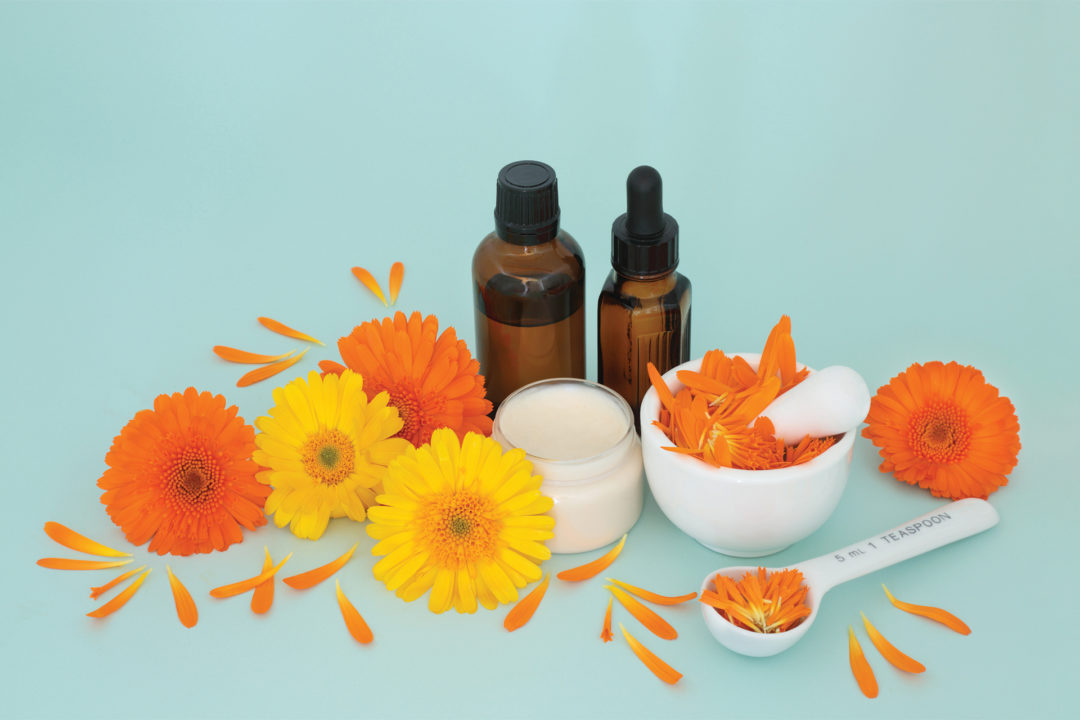When you step into a chain big box, pharmacy, or beauty store, there are aisles upon aisles of products claiming to make skin radiant and healthy. On the outside, these products look appealing, with packaging that promises fast results. In reality? Many of these products can do more harm than good. In The Best Natural Skin Care Ingredients for Your Beauty Routine, Jillian Levy, CHHC, cautions that the chemical fragrances and ingredients used in many products have been linked to potential issues like irregular periods, infertility, and allergies.
Natural skin care, on the other hand, “utilizes ingredients found in nature, such as certain herbs, flowers, roots, fruits, and other plants,” says Levy. “When you use natural products like this regularly, not only do you beautify your skin, but you also absorb antioxidants, enhance your skin’s UV resistance, and stimulate your immune system, too.”
Skin type essentials for summer
Skincare is not a one size fits all approach, and the key to getting it right is knowing your skin type, according to the experts at Reviva Labs. For oilier skin, consumers are well-served by products made with salicylic acid, zinc oxide, activated charcoal, and niacinamide. All of these ingredients help combat excess oil, breakouts, and hyperpigmentation. During the summer months, the experts at Reviva recommend washing along the outer edges of the face and hairline to ward off breakouts.
For those who deal with dry and flaky skin in the summer months, Reviva's experts suggest products with ceramides and essential fatty acids. These ingredients will keep skin moist without leaving it feeling sticky. Another issue is sensitive skin, which can be aggravated heat and humidity. People with this skin type can look for products that have soothing natural oils like hemp oil, and calming medicinal herbs like ashwagandha and turmeric.
Face oils in summer? Yes!
For customers who worry that facial oils might make skin greasy, the experts at Perricone MD say this is a big fat myth. Face oils offer benefits for all skin types, they say. "From chia and jojoba to rosehip and tea tree, these oil-derived products are formulated with antioxidants and essential fatty acids to help restore and strengthen the skin barrier, lock in moisture, smooth fine lines and wrinkles, even skin tone, and more. As trendy as oils are, though, there are a lot of misconceptions that come along with the buzz. The skincare community continues to ask: Do facial oils cause acne? Do facial oils clog pores? Can facial oil be used as a moisturizer? The truth is that the answer to each of these questions is the same: no." They outline the misconceptions in 5 Myths About Facial Oils & Why You Actually Need One in Your Regimen.
Levy also points to the power of oils, and outlines the benefits of some standouts: Argan oil has long been renowned as a skin care gem, boosting vitamins A and E, omega-6 fatty acids, antioxidants, and linoleic acid. It can help soothe bug bites, eczema, dryness, and psoriasis, according to Levy. And coconut oil can be used both in hair and on skin as a natural moisturizer, Levy says. It can provide benefits such as removing dead skin cells, and protecting from sunburn. It is best for dry or combination skin types. Another staple is tea tree oil, which Levy notes is often is used to tackle breakouts and redness. It works as a natural anti-inflammatory, and is antibacterial, antimicrobial, and antifungal.
Of course, no summertime medicine cabinet is complete without aloe vera, which is great for soothing skin after direct sun exposure. Together, aloe vera and colloidal silver can work to dehydrate dry, sunburned skin, according to the experts at Natural Path Silver Wings. The experts note, "To nourish and soothe your skin after sun exposure and other damaging assaults, look for 1) colloidal silver, 2) aloe vera, and 3) tea tree oil. These ingredients are remarkably effective and have been among the most popular choices for generations....Colloidal silver gel is recommended to help manage sunburn, minor scrapes and cuts, dry skin, rashes, insect bites and stings to name only a few."
Also consider pointing consumers to aloe plus essential oils as an alternative to bug spray. "Commercially produced repellants can contain harmful ingredients," the experts at Lily of the Desert caution. They offer a recipe for a DIY option with aloe and peppermint oil and lavender oil that can be an alternative, especially for those with young children, allergies, or sensitive skin.
The scoop on sunscreen
Chemical sunscreens don’t necessarily protect as much as some may think, asserts Ann Louise Gittleman, Ph.D., CNS. She cautions that chemical sunscreens allow harmful UVA rays through and these rays not only cause wrinkles and premature aging of the skin, they also suppress the immune system. What's more: “Sunscreens block the UV rays needed for your body to make vitamin D from sunlight. Vitamin D, known as the 'sunshine vitamin,' is needed for proper calcium absorption, healthy bone development, and prevention of osteoporosis.” When the day calls for lots of time in the sun, she recommends mineral-based sunblock. Read her recommendations in Skin Care Tips for Ageless Beauty.
.










